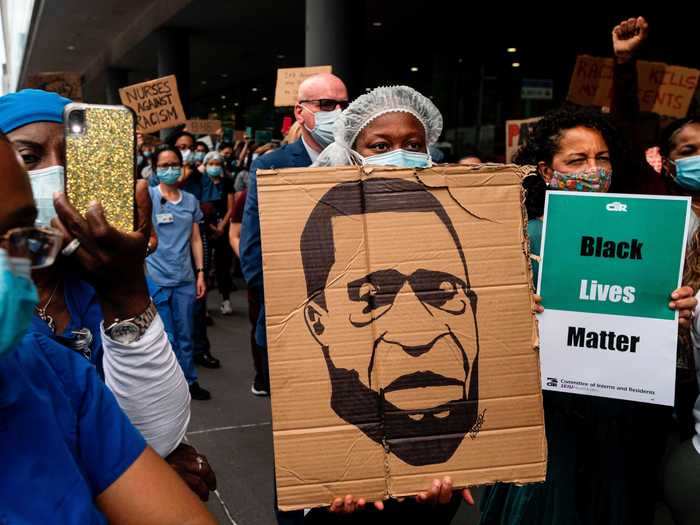
Nurses and healthcare workers attend a Black Lives Matter rally in front of Bellevue Hospital on June 4, 2020, in New York City.Johannes Eisele/AFP/Getty Images

On June 4, hundreds of healthcare workers from New York City's Bellevue Hospital congregated outside in a show of solidarity with those protesting against racial injustice nationwide.
They knelt in recognition of the recent death of George Floyd at the hands of Minneapolis police officers, but also spoke up about the daily impact of racism, including during the current viral pandemic, The City reported.

Protesters chanted "Black Lives Matter" at the demonstration to call attention not only to Floyd but to the long list of Black Americans before him who have been killed with impunity, by police and others, including Breonna Taylor, Jamar Clark, Philando Castile, and Trayvon Martin.
"One in every 1,000 Black men and boys can expect to be killed by police in this country," Dr. Maia Majumder, an epidemiologist at Harvard Medical School, told Vox. "To me, this clearly illustrates why police brutality is a public health problem; anything that causes mortality at such a scale is a public health problem."

Racism includes a wide range of systemic inequalities including in socioeconomic status and healthcare. One consequence of this is that people of color have been disproportionately impacted by the novel coronavirus.

Healthcare workers are also rallying because police use of force can exacerbate the risks of the current pandemic — mass arrests and tear gas, which causes coughing and disorientation, can both increase the risks of viral transmission.

Medical professionals who are protesting have said they take precautions, including changing clothes and scrubbing down immediately afterward.
"It's about making sure you're prepared and cautious," said Dr. Ernest Brown, a family medicine physician in Washington, DC.

"People fighting injustice are fighting because lives are at stake," Dr. Arjun Arya, who works in emergency medicine at Hennepin Healthcare in Minneapolis, Minnesota, previously told Insider.
"If you're so vocal about COVID but not anti-racism, there's a divide that you need to reflect on."
Read more:
 I spent $2,000 for 7 nights in a 179-square-foot room on one of the world's largest cruise ships. Take a look inside my cabin.
I spent $2,000 for 7 nights in a 179-square-foot room on one of the world's largest cruise ships. Take a look inside my cabin. Colon cancer rates are rising in young people. If you have two symptoms you should get a colonoscopy, a GI oncologist says.
Colon cancer rates are rising in young people. If you have two symptoms you should get a colonoscopy, a GI oncologist says. Saudi Arabia wants China to help fund its struggling $500 billion Neom megaproject. Investors may not be too excited.
Saudi Arabia wants China to help fund its struggling $500 billion Neom megaproject. Investors may not be too excited. Catan adds climate change to the latest edition of the world-famous board game
Catan adds climate change to the latest edition of the world-famous board game
 Tired of blatant misinformation in the media? This video game can help you and your family fight fake news!
Tired of blatant misinformation in the media? This video game can help you and your family fight fake news!
 Tired of blatant misinformation in the media? This video game can help you and your family fight fake news!
Tired of blatant misinformation in the media? This video game can help you and your family fight fake news!

Copyright © 2024. Times Internet Limited. All rights reserved.For reprint rights. Times Syndication Service.